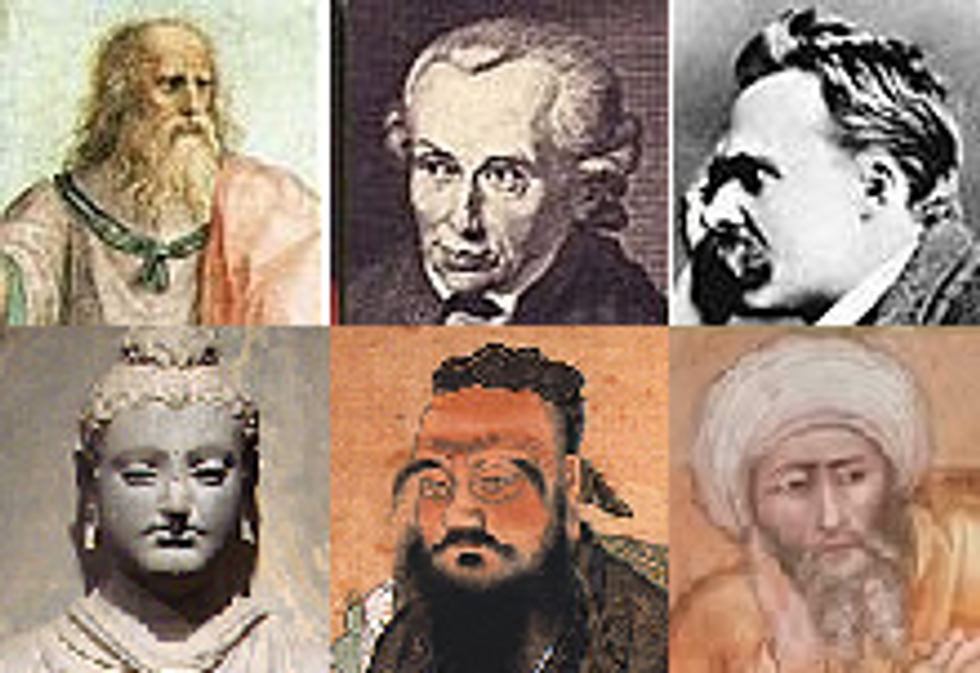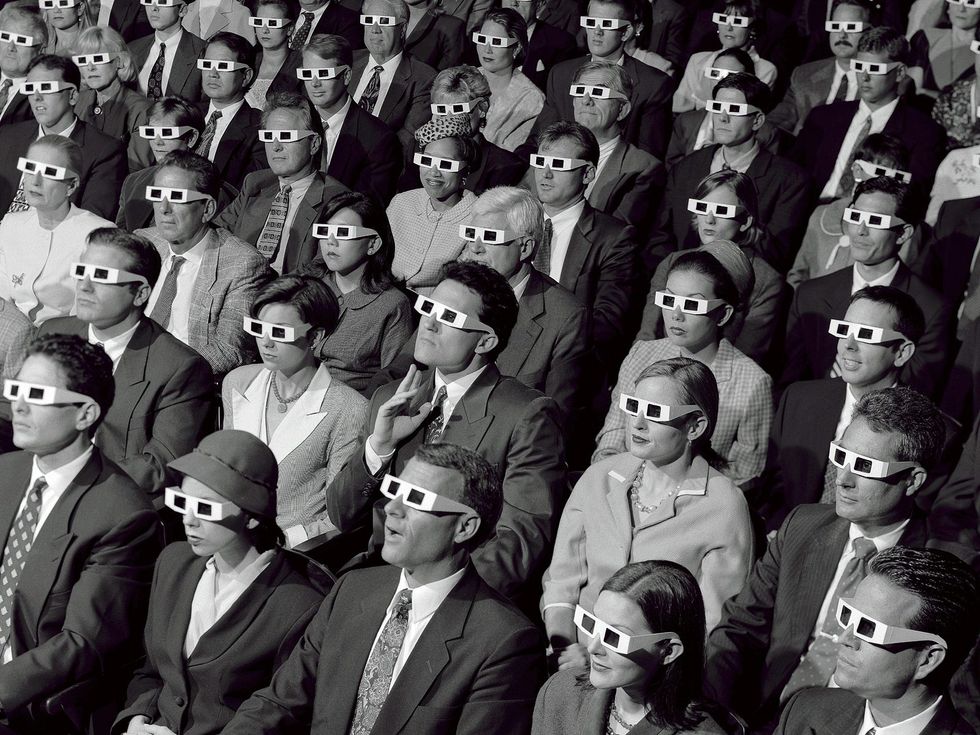It has become one of the chief passions of my life. It has become something that continually occupies the walls of my mind. I can honestly say that I delight in it and enjoy every opportunity to be involved in it despite its very real difficulty and rigor that without a doubt can become exhausting. What I am talking about is philosophy, that nebulous but extraordinarily wondrous discipline. Philosophy, though just one mere word, has the curious ability to bring up feelings of mirth in people hungry for knowledge and wisdom about reality and to bring up feelings of terror in people who aren't familiar with it and see that they must take it for their degree; believe it or not I myself was in the latter camp when I first got plugged into the study of philosophy.
Philosophy is something that has gone on for all of human history, that has beautified cultures and civilizations of the world when handled well, has captivated the most brilliant minds and will continue to do so, and contrary to the beliefs of thinkers like the late Stephen Hawking is far, far away from perishing. But like most good things in our world, philosophy can be wielded as a club and be used to bludgeon cultures and civilizations finer than dust. History, though greatly beneficial to study and fruitful for life to know in its own right, is in one sense the long story of bad sorts of philosophy running people groups and nations into the ground from the barbarism that study has revealed to be present in the Ancient Near East with nations such as Assyria to the horrifying political theories of communist nations that have gallons of blood on their hands. But in the right hands, or more accurately the right sort of minds, philosophy can be a companion to help wisdom increase and an effective tool for moral, political, and social change.
So, with all of that said, what exactly is philosophy? The term "philosophy" comes from the Greek word philosophia, which comes when the Greek words philia/phileo and sophia, which mean, to put it basically, a friendly affection or love and wisdom respectively. Therefore, it may be said and rightly so that philosophy is the love of wisdom and following from that that the philosopher is a lover of wisdom, purely from a linguistic standpoint. The Oxford Dictionary defines philosophy in the following way: "the study of the fundamental nature of knowledge, reality, and existence. Socrates famously said "the unexamined life is not worth living," a quote that has incredibly influenced my life. I don't know the context in which it was originally said, but the English philosopher Bertrand Russell once said: "whoever wishes to become a philosopher must learn not to be frightened by absurdities. Again, I don't know the overall context of that statement, but that is in large part true from the standpoint of someone such as myself that is relatively new to the study of philosophy. Though these definitions of what philosophy is may be a basic introduction to the discipline, they at least serve to show that to describe philosophy, more explanation is required than "dude...that's deep."
Though philosophy is often understood as being, in a sense, broken up based on what discipline is being carefully analyzed and pondered, such as, say, Philosophy of Religion, which is probably my personal favorite sub-discipline of philosophy, or Philosophy of Science, which is a discipline that thinkers such as the Victorian thinker Charles Darwin or the modern atheist thinkers Richard Dawkins and Michael Ruse were and are involved in. But in addition to these understandings of what plays into the study of philosophy, philosophy is made up of some essential parts, one might say, which are ontology, logic, epistemology, ethics, and aesthetics. All of these are essential to philosophy like the irreducible complexities in a cell and have aspects that are simple and easy to grasp as well as aspects that can daze even a pretty educated person with their very serious depth. To understand philosophy in any way, these things must be explored to some degree, so what are they?
1. Ontology
Ontology may be simply understood as the study of the nature of being. Some questions of ontology may be things like "does God exist?" or "is there such a thing as real right and wrong in the world?" Someone spending time on matters of ontology may deal very carefully with things like the aforementioned questions. As for me, since I am a Christian apologist and aspiring pastor, I often deal both with considerations in my own mind and questions and objections from others about things on ontology. To go much further on ontology may be to bite off more than I can chew, as it is truly nebulous and complicated and can be admittedly aggravating due to how it possesses the ability to spin your head like a curious child spins a globe in a store. To mention one more thing, one of the best arguments for the existence of God is called the Ontological Argument and to you, reader, I commend it and encourage you to check it out. Ontology is often also referred to as a sub-discipline of metaphysics but the difference between the two fields is, to me, a bit nebulous.
2. Logic
Christian intellectual Nel Brace defines logic as the tool of how we come to understand things. This seems to be an apt way to describe this discipline as well, as logic is undoubtedly a conscious enterprise and all clear thinking is governed by the "laws of thought," as some have called them. Everyone that lives is unable to not use logic and participate in it, as it is necessary for life. That being said, the idea of actually studying logic is intimidating to many people and even though that sounds silly given that doing logic is a must of life, it is not so silly when one actually goes about parsing through all the different logical fallacies and other related parts of the discipline. For me as an apologist and a student of the Bible, the most exhilarating thing about studying logic is to see that there is no law of logic that is broken by the Christian religion and all attacks that have been mounted by atheistic and skeptical thinkers from all ranges of life to the contrary have shown to more resemble swiss cheese than razor sharp, unbeatable refutations. The main laws of logic are the law of identity, the law of non-contradiction, and the law of excluded middle.
3.Epistemology is defined as the study of knowledge and it may be said that epistemology concerns two primary questions, which are "what does it mean to know or not know?" and "how much do we or can we know?"is defined as the study of knowledge and it may be said that epistemology concerns two primary questions, which are "what does it mean to know or not know?" and "how much do we or can we know?" It is essential that epistemology not get confused with ontology, which is not so much considering what we can know or how we can know things but instead what is in reality. I say this because it is unfortunately all too often that people coming at things from skeptical perspectives confuse the two when the approach an argument for the existence of God, such as the Moral Argument. The skeptic may say something like "objective moral values and duties do not exist because we have evolved to believe what we believe about moral values and duties." This doesn't refute the Moral Argument because it is only making an assertion as to how we know something rather than attacking the affirmation that objective moral values and duties exist in the real world. Epistemology may also consider what real sources of knowledge are, such as scientific experimentation or reliable testimony.
4. Ethics
It may be the case that the most fundamental question when it comes to ethics "what is the good?" Ethics, in short, is the study of morality and the nature of it. There is so much that can be said about this discipline of philosophy, more than I can say here in this article serving as a very basic intro into the whole thing. Ethics may concern questions such as "is there really good and evil in the world?" and "what makes a thing good?" In his book Euthyphro, Plato talks about a dialogue between Socrates and Euthyphro and in it a good question of ethics, which basically goes like this: "is something good because God wills it or does God will something because it is good?" comes up. This question is often referred to by philosophers as Euthyphro's Dilemma. As a Christian apologist, my own view is one called moral realism, which basically is to say that I believe that objective moral values and duties exist and are grounded in the essential goodness of God's nature.
5. Aesthetics
There you have it; an extremely basic introduction to philosophy and the pillar disciplines that make it what it is. My favorite academic discipline overall is theology, given my faith and desired occupation and path in life, however I cannot commend studying philosophy enough and I recommend it to anybody that desires to be involved in things such as pastoral ministry, apologetics ministry, teaching, psychology, or even to just be a merely cultured person. Philosophy has made me more cultured, more thoughtful, more humble, it has helped me understand theology and theologically grow, and most importantly of all, it has tremendously helped me grow in my relationship with God and treasure Him more, which I believe is the chief end of human life. So, my counsel is to not stop here but to press on to become more learned in philosophy, even if it is intimidating.



 all stars lol GIF by Lifetime
all stars lol GIF by Lifetime two women talking while looking at laptop computerPhoto by
two women talking while looking at laptop computerPhoto by  shallow focus photography of two boys doing wacky facesPhoto by
shallow focus photography of two boys doing wacky facesPhoto by  happy birthday balloons with happy birthday textPhoto by
happy birthday balloons with happy birthday textPhoto by  itty-bitty living space." | The Genie shows Aladdin how… | Flickr
itty-bitty living space." | The Genie shows Aladdin how… | Flickr shallow focus photography of dog and catPhoto by
shallow focus photography of dog and catPhoto by  yellow Volkswagen van on roadPhoto by
yellow Volkswagen van on roadPhoto by  orange i have a crush on you neon light signagePhoto by
orange i have a crush on you neon light signagePhoto by  5 Tattoos Artist That Will Make You Want A Tattoo
5 Tattoos Artist That Will Make You Want A Tattoo woman biting pencil while sitting on chair in front of computer during daytimePhoto by
woman biting pencil while sitting on chair in front of computer during daytimePhoto by  a scrabbled wooden block spelling the word prizePhoto by
a scrabbled wooden block spelling the word prizePhoto by 
 StableDiffusion
StableDiffusion
 StableDiffusion
StableDiffusion
 StableDiffusion
StableDiffusion

 women sitting on rock near body of waterPhoto by
women sitting on rock near body of waterPhoto by 
 Photo by
Photo by  Photo by
Photo by  Photo by
Photo by  Photo by
Photo by  Photo by
Photo by  Photo by
Photo by  Photo by
Photo by  Photo by
Photo by  Photo by
Photo by  Photo by
Photo by 









